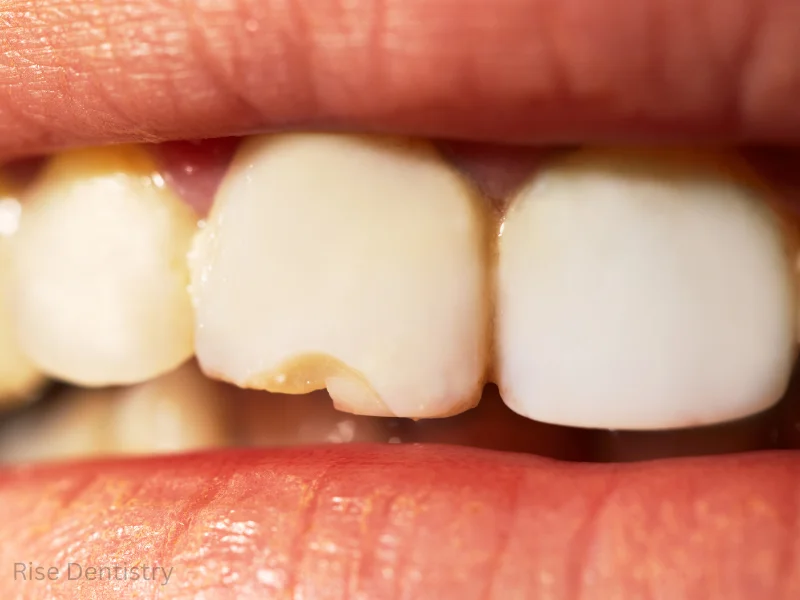
A broken tooth can be repaired with fillings, crowns, or other dental treatments. Book your appointment today for prompt and effective care!
Breaking a tooth is a serious dental emergency that needs prompt attention. It can occur unexpectedly due to various causes, such as an injury, a cavity, or simply chewing on something too hard. No matter the cause, it’s essential to address the problem quickly. Broken tooth repair can restore not only the functionality of your tooth but also its aesthetic appearance.
When you know how to fix a broken tooth, you can avoid complications like infection or further damage. Seeking timely professional care is crucial to prevent more severe issues down the road. In this blog, we’ll cover what to do when a tooth breaks, what treatment options are available, and how to prevent it from happening in the future.
Breaking a tooth can be a shocking and painful experience, but taking the right steps immediately can help minimize damage. Begin by rinsing your mouth with warm water to wash the area and remove any debris.
If bleeding starts, gently apply a clean cloth or gauze to control it. To ease swelling, use a cold compress on the outside of your mouth, which will help numb the pain. Avoid using the broken tooth to chew or touch it to avoid further injury. If possible, save the broken piece of the tooth and bring it to the dentist.
If the pain is unbearable, over-the-counter painkillers like ibuprofen can help manage broken tooth pain relief until you can get professional care. However, don’t wait—contact your dentist immediately for emergency dentistry services. Immediate attention is essential to avoid complications like broken tooth infection or further damage to the tooth structure.

There are several reasons why a tooth can break, and understanding the cause is essential for treatment and prevention. One common cause is a cracked tooth, often the result of biting down on something hard or an injury.
Chipped teeth are another common issue, especially in the case of sports injuries or accidents. Teeth can also break due to tooth decay, where weakened enamel becomes more susceptible to breaking. Sometimes, a broken tooth occurs simply due to normal wear and tear over time, particularly in older individuals.
Damage to the tooth enamel is one of the main contributors to a broken tooth. Enamel is the tooth’s outermost layer, and when it’s compromised by decay or injury, the tooth becomes more vulnerable to cracks and breaks. The strength of a tooth is also influenced by its overall structure. Teeth with large fillings or structural issues may be more prone to breaking. Understanding the underlying causes helps in choosing the right broken tooth removal method.

The treatment required for a broken tooth varies based on how severe the damage is. For minor chips or cracks, broken tooth repair might involve a simple filling or bonding. This is usually enough to restore the appearance and function of the tooth. However, for more significant damage, other treatment options may be necessary.
If the tooth is severely broken or cracked, broken tooth replacement with a crown may be the best option. Crowns cover the entire tooth, protecting it from further damage and restoring its appearance. In cases where the tooth pulp is affected, a root canal might be required to remove infected tissue before placing a crown or filling.
For a broken front tooth repair, which is more visible, a dentist may use composite bonding or porcelain veneers to restore its natural look. For broken back teeth, a more durable solution like a crown or root canal may be recommended to ensure the tooth functions properly.
It’s also important to preserve as much of the natural tooth as possible. If a large portion of the tooth is missing, a broken tooth extraction may be needed, followed by a dental implant to replace the tooth.
While the body has a natural ability to heal some injuries, broken teeth cannot heal on their own. A broken tooth requires professional care to restore its function and appearance. If left untreated, the tooth may develop broken tooth infections, leading to more severe issues like abscesses or tooth loss.
Additionally, cracks and chips can worsen over time, causing further damage to the tooth structure and surrounding teeth. Professional treatment ensures that the broken tooth is properly repaired, preventing complications and maintaining the overall health of your mouth.

The time it takes to fix a broken tooth depends on the severity of the damage. For minor chips, a dentist can often repair the tooth in a single visit. Treatment could involve placing a filling or using bonding material to restore the tooth’s shape and function.
More advanced treatments like tooth extraction or a root canal may require several appointments to fully complete. Typically, a crown or filling can be placed on the second visit. Your dentist will provide a treatment plan that outlines the steps and timeframes for your specific situation.

Broken teeth can be painful, especially if the nerve is exposed. During treatment, dentists commonly use local anesthesia to numb the area, ensuring the procedure is pain-free. Before your dental visit, you can manage pain at home by taking over-the-counter pain relievers such as ibuprofen or acetaminophen. Applying a cold compress on the outside of your cheek can also help reduce swelling and numb the pain.
It’s important not to chew on the broken tooth to avoid aggravating the pain and causing further damage. Once your dentist examines your tooth, they will determine the best way to treat the pain and repair the tooth.

While accidents can happen, there are steps you can take to minimize the risk of broken teeth. Wearing a mouthguard during sports or physical activities can help protect your teeth from injury. Avoid chewing on hard items like ice or candy, which can put unnecessary pressure on your teeth.
Additionally, maintaining good oral hygiene to prevent tooth enamel decay is crucial. Regular dental check-ups allow your dentist to detect any potential issues with your teeth and address them before they lead to a break.

If you break a tooth, it’s crucial to see a dentist as soon as possible. Delaying treatment can lead to more severe problems, such as broken tooth infection or further damage to the tooth structure. Even if the pain is minimal, it’s important to have the tooth evaluated by a professional to ensure it’s properly repaired and to avoid complications down the road. Emergency dentistry services are available for immediate treatment to prevent any additional damage.

The cost to fix a broken tooth can vary greatly depending on the severity of the damage and the type of treatment needed. Simple repairs, like fillings or bonding, are typically more affordable. For more extensive repairs, such as crowns or root canals, the cost can increase significantly. The total cost may also depend on whether or not the treatment is covered by your insurance.
For example, a broken tooth extraction and replacement with an implant can be a more expensive option compared to a simple filling. The good news is that most dental insurance plans cover at least part of the cost of broken tooth repair, especially if the damage was caused by injury or decay. Checking with your insurance provider to understand your coverage is important. Your dentist can also provide you with a cost estimate and available payment plans.

Cleanse your mouth with warm water, use a cold compress to reduce pain, and refrain from chewing on the broken tooth. Call your dentist for immediate care.
A broken tooth cannot heal on its own and needs professional care to avoid complications such as infections or additional damage.
Treatments for a broken tooth can include fillings, crowns, root canals, or extractions, depending on how serious the damage is.
Simple repairs may be completed in one visit, while more complex treatments like root canals or extractions may take longer.
The procedure is typically pain-free thanks to local anesthesia, and any discomfort is manageable with pain relief.


Promptly addressing a broken tooth is vital to prevent further damage and discomfort. With professional care, you can restore your tooth’s appearance and function. If you’ve broken a tooth, contact Rise Dentistry for immediate care and emergency dentistry services. We are here to assist you in restoring your smile with confidence.
EXCELLENTTrustindex verifies that the original source of the review is Google. "For years, I avoided the dentist due to my anxiety. Dr. Hassan sorathia and their team completely changed my perspective. The office has such a calming atmosphere, and the staff is compassionate and understanding. They explained every step of my treatment and made sure I was comfortable. I'm so grateful I found them and can now take care of my teeth without fear."Posted onTrustindex verifies that the original source of the review is Google. Rise was amazing! They extracted a wisdom tooth from me and the experience was completely pain free. Thank you so much!Posted onTrustindex verifies that the original source of the review is Google. I’m so grateful I found Dr. Sorathia and his wonderful staff at Rise Dentistry! From the moment I called, his office was incredibly accommodating and got me in immediately. He was professional, kind, and patient, and he truly understood my dental anxiety. I never felt rushed or pressured and he welcomed all my questions and explained each step of the process so I always knew what was happening. He made sure I understood all of my options, allowing me to make the most informed decision for my care. I left feeling comfortable, informed, and confident about my treatment. I will absolutely be returning to Dr. Sorathia and highly recommend him to anyone looking for a compassionate and thorough dentist.Posted onTrustindex verifies that the original source of the review is Google. I’m so glad I found this office! Staff is so kind and professional. They keep your comfort at the top of their priority list. Wish I had found them sooner! Can’t recommend this dentist enough!Posted onTrustindex verifies that the original source of the review is Google. Excellent Staff and Dr Sorathia very knowledgeable pleasant ambiance !Posted onTrustindex verifies that the original source of the review is Google. Had a great experience, no wait time, in and out. Everyone was friendly, informative and professional.Posted onTrustindex verifies that the original source of the review is Google. So refreshing to meet an HONEST dentist who isn’t trying to upsell you anything. Just tells you the facts doesn’t try to sway your opinion, just lays out the options based on facts and allows you to choose for yourself what works best for you. I definitely highly recommend!Posted onTrustindex verifies that the original source of the review is Google. Fantastic service! Had a bad tooth that was absolutely killing me for several days. I load going to the dentist so I don’t have a normal one. Set the appointment in the morning and got in that same day. The dentist explained saving versus extracting the tooth and 35 minutes later I was going home. He was extremely thorough and telling me what he was going to do and with the post office instructions. The staff both out front and his assistants were fantastic!! absolutely could not have asked for a better experience and he will be my dentist going forward.
© 2023-2025 Rise Dentistry. All rights reserved.